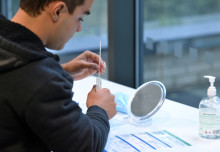

Chairman of the Olympic Delivery Authority Sir John Armitt speaks at Imperial College Business School
By Tanya Gubbay
Friday 16 March 2012
In 133 days, the Olympic Cauldron will be lit at the stadium, signaling the beginning of the London 2012 Olympics. The Chairman of the Olympic Delivery Authority this week shared his vision, strategy and journey in transforming London into a world-class Olympic venue as well as establishing an enduring legacy for the city, in a Distinguished Guest Lecture at Imperial College Business School.
Sir John Armitt spoke of the paramount need to ensure that the project was delivered on time and to the project brief, with sustainability providing a key focus. For example, much of the soil in the area of Olympic Park was contaminated with a mix of heavy metals and hydrocarbons, but instead of sending it all to landfill, the team decided to wash the soil, with 95% of waste recovered from two million tonnes of soil.
See also:
Related news stories:
John also said it was essential to create a lasting legacy for London, with parts of the infrastructure designed in such a way that it will be able to service new housing which will be developed within the Olympic Park after 2012. In addition, £500 million has been invested in improving transport, which includes a 50% increase in Docklands Light Railway (DLR) capacity with longer trains and the North London line capacity increased by 45%.
The stadiums were built with sustainability and future use in mind, and John highlighted the ‘Copperbox’ Handball arena which is constructed from 65% recycled copper, while the basketball stadium will be taken down after this summer and is likely to be used at the next Olympic Games in Rio. An important part of London’s Olympic bid was the legacy aspect, he said, and the Olympic stadium itself has been designed to be modified from its current capacity of 80,000 to a 25,000 capacity athletics stadium for continued use after 2012.
With 96% of the project complete (as of March 2012), John said that the successful delivery of the Olympic project has been achieved with strong cross party political support, a sensible budget to enable quality decisions, clear leadership and a rigorous approach to management. Innovative contract structures were introduced which meant that while contractors were liable for cost increases, they would also benefit from savings which benefitted cost management, and local jobs created, with 25% of people employed from local boroughs and 450 apprenticeships established. Following the Games, he sees the legacy for the UK and for London - including increased benefits in sports, employment and training, sustainability and in business – lasting for several decades after the last Olympic athlete has crossed the finished line.
Tanya Gubbay caught up with him after his talk:

£500 million has been invested in improving London transport
Is London now fully ready for the Olympics?
Not entirely. Yes, all the main infrastructure and venues are complete but LOCOG (London Organising Committee of the Olympic and Paralympic Games) are now working on all the back of house facilities, retail outlets, broadcasting equipment, temporary stands, etc etc. A lot to do but we will be ready!
How have you worked to ensure that the project was run on time and achieved within budget?
By ensuring that decisions were made on time, being very disciplined in change management and regularly auditing to ensure optimism was not blinding us to the risks. Commercially, the target price design and build form of contract has also helped, where a price is agreed with the contractor prior to the project starting and on completion any savings made are split between the contractor and purchaser. Alternately, if any additional costs have been incurred these would also be split.
What was the biggest challenge you faced?
The loss of private sector funding in 2008 for the Olympic Village. We had to finance it using our contingency monies and other savings.
Which athlete were you/are you most excited to meet?
I have met a number. The striking thing is their personal journey. They are all incredibly focussed and determined and act as role models for anyone with ambition.
If you could compete in the Olympics, which sport would you go in for and why?
Sailing has been a hobby for many years, so I would enter the Star class yachting.
What do you want people to remember about the London Olympics?
How wonderful it is to be in London and in twenty years how the city has benefited from hosting the 2012 Games. Indeed, housing stock increased by 3000 for the Games with a further 8,000 planned in the Park over the next 20 years. The IBC and MPC (International Broadcast Centre/Main Press Centre) represent one million square foot of new employment space in Hackney with potential for thousands of jobs. London will have a new ‘place’ for sport, leisure and work shifting the balance towards the east.
-ends-
Article text (excluding photos or graphics) available under an Attribution-NonCommercial-ShareAlike Creative Commons license.
Photos and graphics subject to third party copyright used with permission or © Imperial College London.





